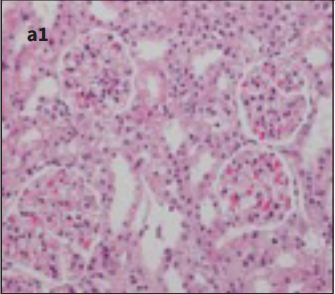Objective: Some studies have shown that keto amino acids (KA) reduce proteinuria and improve renal function as well as nutritional status in patients with diabetic nephropathy. We aimed to compare the pathologic findings of kidneys of rats that were given protein-restricted diets enriched with KA with those of rats given protein-restricted diet alone.
Materials and Methods: The study included 22 16-week-old Sprague–Dawley rats and was conducted at the research center. The rats were randomly divided into two equal groups. Group I (study) received KA (35-70 mg/kg) with gavage along with low-protein diet (10% protein), and Group II (control group) received low-protein diet alone. The treatment was continued for 2 weeks, after which the study ended. Blood samples were obtained in the 5th and 7th weeks of treatment for measuring albumin and creatinine levels; bilateral nephrectomy was performed at the end of the study.
Results: All rats had minimal thickness of the basement membrane. The serum albumin levels were significantly higher in the study group (p<0.05). The study group rats had greater thickness of the basement membranes.
Conclusion: Our study may inspire further studies in this particular field with the question whether KA can slow the progression of diabetic nephropathy.
Cite this article as: Deligöz Bildaci Y, Çoban G, Bulut H, Gürsu M, Elçioğlu ÖC, Kazancıoğlu R. Effects of Keto-analogs in the Pathologic Findings of Diabetic Nephropathic Rats. Turk J Nephrol 2020; 29(1): 23-7.

.png)


.png)

.png)
